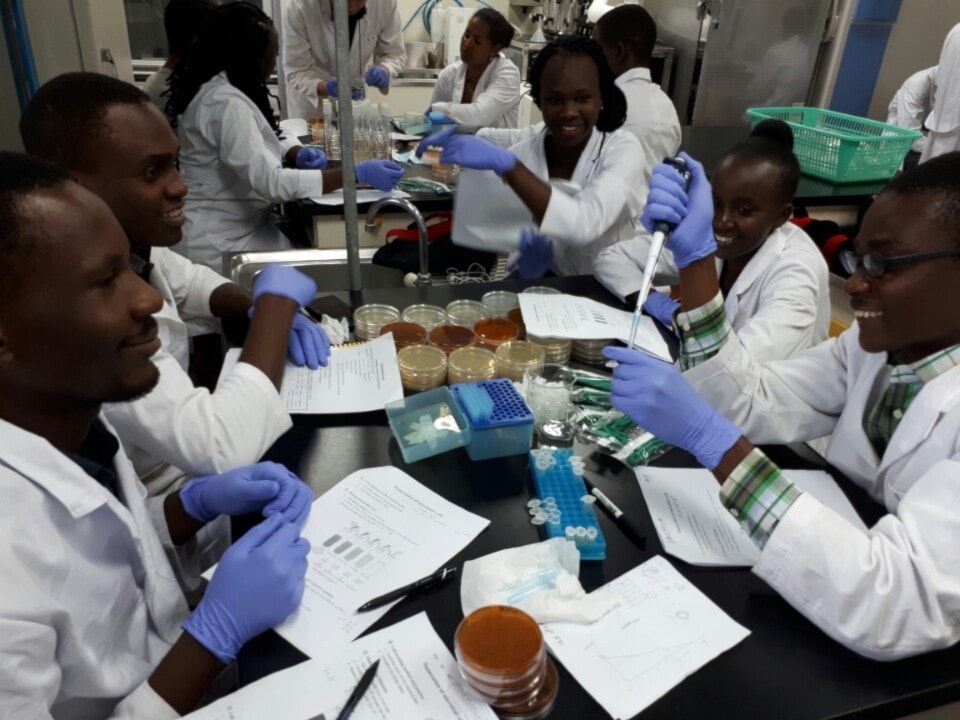Africa needs more PhD graduates but faces funding, support gaps: Study
The Conversation talked to the authors of a new research paper that highlights the challenges faced by African doctoral students, and the potential solutions to their afflictions.
-

A group of African students researching Adaptive Evolution of Yeast strains, on July 17, 2017 (WikiCommons)
A new study highlighted that African nations are facing growing pressure to produce more PhD graduates, but barriers like funding shortages, limited resources, and supervisory challenges are hindering progress, according to The Conversation, which interviewed the authors of the paper.
The authors of the paper, Oluwatomilayo Omoya, Udeme Samuel Jacob, Olumide A. Odeyemi and Omowale A. Odeyemi, told The Conversation that the study employed a scoping review methodology, which facilitated a comprehensive examination of existing literature across South Africa, Kenya, Ethiopia, Uganda, and Nigeria.
The challenges
Scarcity of resources
One of the most significant challenges facing PhD students in African universities is the scarcity of resources, as many institutions across the continent contend with chronic underfunding, which limits their ability to provide sufficient research facilities, well-equipped libraries, and reliable internet access for both students and faculty.
A significant challenge identified by the authors is the insufficient availability of high-quality doctoral supervision, where the ratio of qualified supervisors to doctoral candidates remains disproportionately low across many institutions, leading to limited individual attention for students and potentially hindering their academic progress.
Supervisors often juggle multiple demanding responsibilities, including their own research projects, administrative duties, and teaching large undergraduate classes, which leaves them with little time to provide adequate mentorship to PhD students, isolating the students as a result.
Securing personal funding
Another challenge noted by the authors was securing personal funding, as scholarships are scarce and often insufficient to cover all the expenses students incur throughout their research, forcing many to take on full-time jobs to support themselves while working toward their doctorate, which can drastically limit the time and energy they are able to devote to their academic pursuits.
"Another challenge is that African doctoral students who do succeed may leave their home countries for better opportunities abroad. The so-called “brain drain” phenomenon has had a profound effect on Africa’s ability to build a strong academic community. While many African PhD students go on to do groundbreaking research in Europe, North America or Asia, their departure means their home institutions – and countries – lose valuable knowledge and experience," the authors of the paper told The Conversation Africa.
Brain drain isn't just about money or quality of life—many students leave because they lack access to advanced research opportunities at home, and once abroad, they find better resources and professional environments that encourage them to stay permanently.
Gender plays a role
"Women pursuing PhDs face additional challenges that their male peers do not. We found that women PhD students frequently face gender biases, both socially and professionally, that make it harder to fulfil their academic goals," the authors told The Conversation.
Women face lower doctoral completion rates than men due to persistent cultural expectations and disproportionate caregiving burdens, as those who are married or have children frequently struggle to balance demanding household responsibilities with the rigorous demands of advanced academic study.
In regions where traditional values prioritize family obligations over professional ambitions, women often experience intensified societal expectations and internalized guilt, further reducing their available time and mental bandwidth for dedicated research efforts.
In contexts where colonial or apartheid-era systems continue to shape institutional frameworks, Black women face compounded marginalization, frequently describing experiences of being systematically undervalued or dismissed within academic environments due to intersecting racial and gender biases, the authors noted according to The Conversation.
The possible solutions
"The challenges facing doctoral students in Africa are complex, but not impossible to overcome," the authors told The Conversation.
"With the right investments and a commitment to reform, universities on the continent can grow into global centres of excellence in research and development. It’s vital for societies not to lose sight of the importance of higher education," they added.
Extensive research demonstrates that robust doctoral training programs and strategic investments in research and innovation are crucial for tackling Africa's unique challenges, as they empower emerging scholars and inventors to develop solutions for some of the globe's most urgent issues, the authors noted.
The authors conclude the interview by saying that "Governments, universities and funding organisations can collaborate by providing scholarships and research grants, creating gender equality policies, and introducing mentorship programmes or improving those that already exist."

 4 Min Read
4 Min Read










